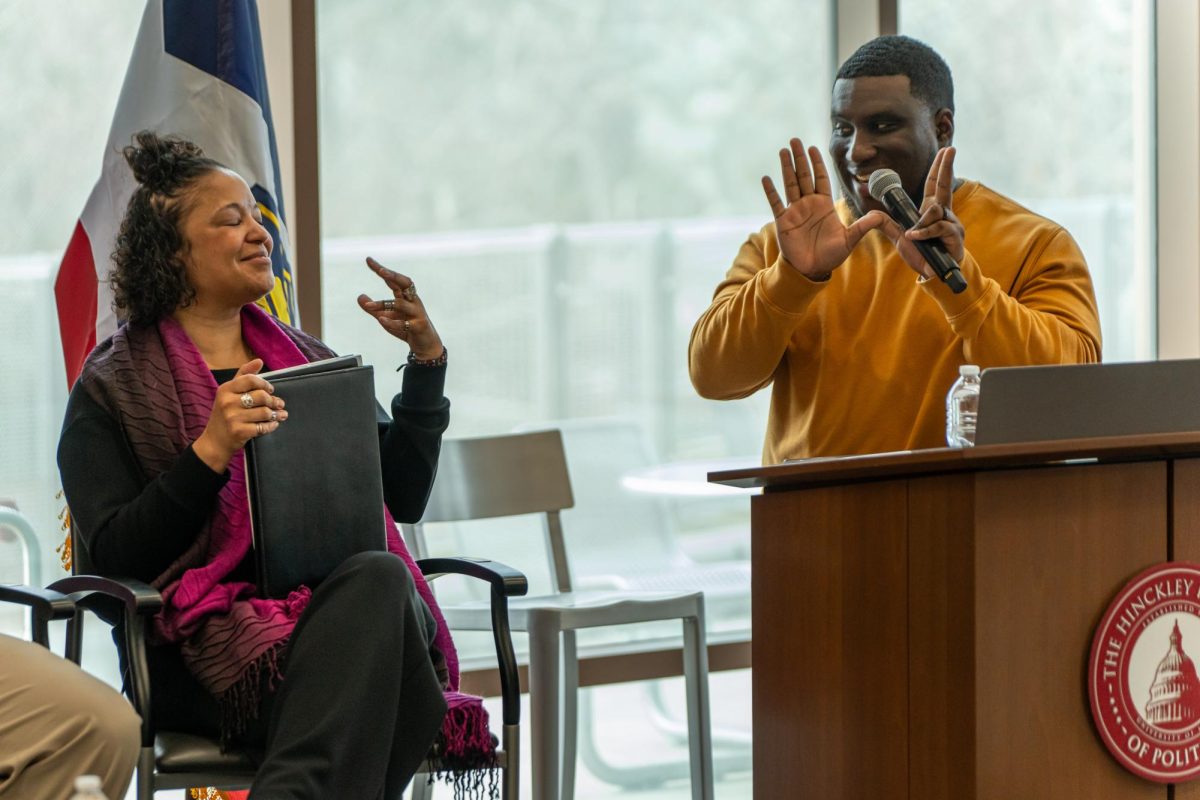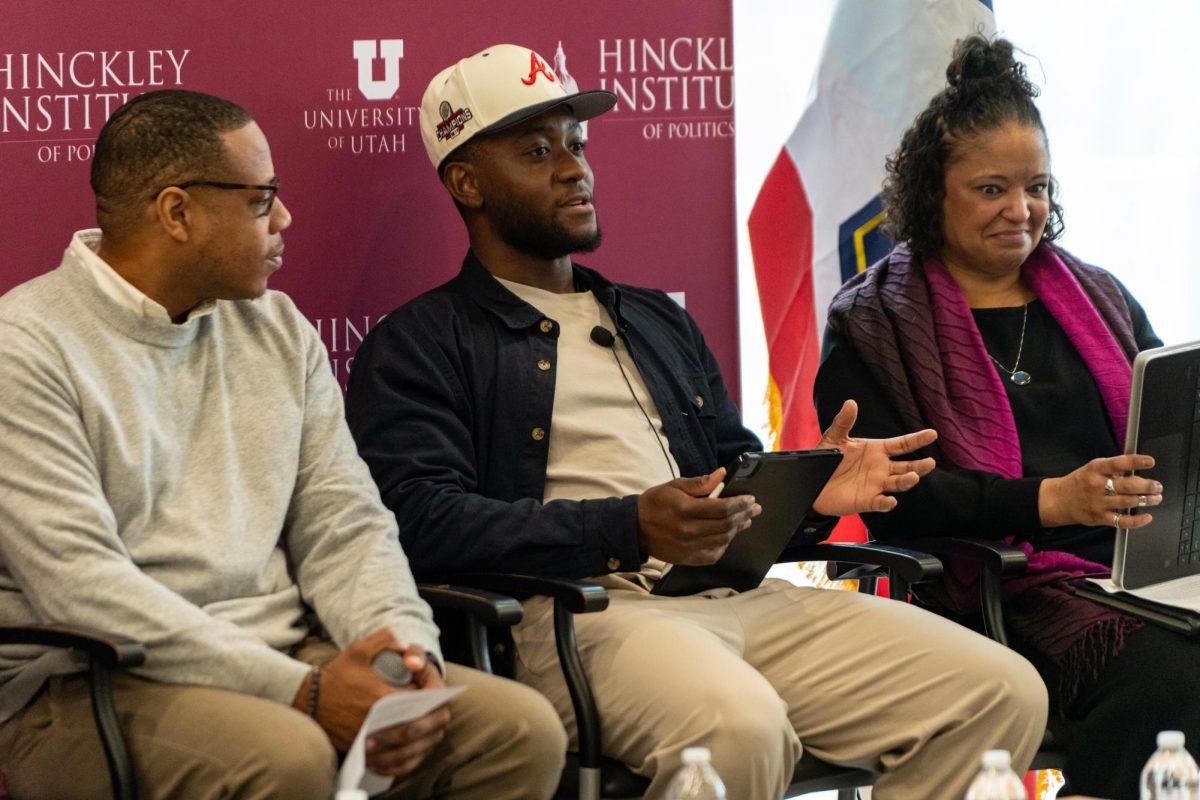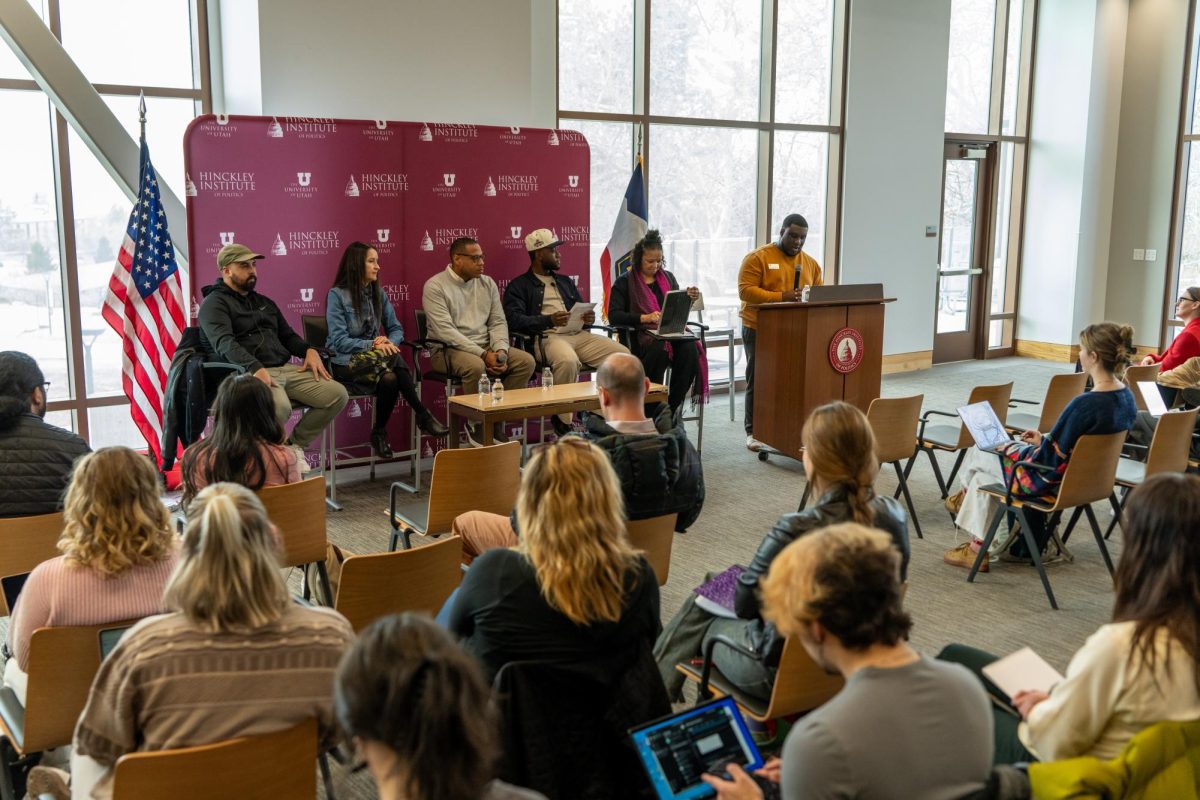The Equity, Diversity & Inclusion office at the University of Utah held its monthly Reframing the Conversation event, “50 Years of Hip-Hop’s Influence on the Culture and Social Movements,” as a part of EDI’s Black History Month event series on Wednesday.
“I think it’s very important when talking about hip-hop as a genre that you reflect on its component to the culture as a whole,” said Keith McDonald, co-host of KRCL’s hip-hop radio show Friday Night Fallout. “So hip-hop is not only rap music — it’s also breaking, graffiti art, DJing and knowledge of the culture.”
The event, held in the Hinckley Caucus Room, included Meligha Garfield, moderator and Black Cultural Center director, Rachel Alicia Griffin, associate professor of race and communication, Ephraim Kum, program coordinator at the Black Cultural Center, Luis Lopez, associate director of First Ascent Scholars, Theresa Martinez, associate professor of sociology and McDonald.
Influences on Race, Identity and Social Justice
When discussing how hip-hop has contributed to discussions of race, identity and social justice, Griffin said hip-hop is “not separate from counterculture and activism — hip-hop is counteractivism and protest.”
Griffin added that for a music artist to be a hip-hop artist, they have to address power dynamics, protest and resistance in some way through their art. That defining feature of hip-hop, Griffin said, allows different hip-hop songs and albums to be something that contributes to a shift in social consciousness.

But when — often intentionally — hip-hop is stripped of its counterculture critique of power dynamics, Griffin argued, that in of itself is the moment of appropriation, whether that happens with an artist, an audience or “right down the road where the [Utah] Jazz play.”
“That is an appropriation of hip-hop culture because it negates a core element of the genre itself,” Griffin said.
As far as specific albums that embody these core elements of hip-hop, Kum pointed to “All-Amerikkkan Bada$$” by Joey Bada$$ and “To Pimp a Butterfly” by Kendrick Lamar.
“’Alright‘ [by Lamar] has become, at least for me and my peers, one of the anthems of Black joy,” Kum said. “And I think of the song ‘i‘ and all the backlash he got for that song because of how directly he addressed police brutality in that song.”
Evolution of Hip-Hop and White Audiences
Across the 50 years of the genre of hip-hop, Griffin argued it has consistently illuminated the “lack of actual, tangible, structural change” in ways that are all interconnected.
As an example, she said some of the famous ’90s rapper Tupac Shakur’s lyrics, in a way, respond to the now passed and signed Utah H.B. 261. The bill, which bans DEI-based programs at public institutions like the U, will act as a “far-reaching rollback of diversity efforts across all of public education and government in the state,” wrote the Salt Lake Tribune.
“Because that is a bill about destructing Black and brown communities and the places we gather,” Griffin said. “We can track the genre of hip-hop in the past to this present where the past isn’t the past. How sad is it that Tupac Shakur can lecture the Utah State Legislature and be right, still?”

Another topic that Garfield brought up is the fact that hip-hop, especially in the last decade, has become mainstream, so it’s safe to say the majority of people who listen to hip-hop music are white.
In response, Lopez quoted “Hiphop Vs. Rap” by KRS-One, a rapper who was popular in the ’80s and ’90s: “Rap is something you do, Hip Hop is something you live.”
“These industries have caught on that you can perform the act, you can promote stereotypes from ‘urban communities,’ which is coded for Black and brown, and you can monetize this,” Lopez said.
The Future of Hip-Hop
Going forward, Luiz said he thinks hip-hop will continue to be the “soundtrack to the resistance,” as well as the “voice of those who haven’t had a platform, as long as we still protect it and be mindful of what is coming authentically from the community and what is being curated.”
Griffin made a point to say that it’s important to remember that hip-hop as a genre and movement, as well as some of its leaders, have fallen short and are imperfect.

“The folks who come to mind as those who defined the genre and were at the turning points are typically Black men and that in of itself signals that there are barriers within the genre,” Griffin said. “… I struggle with hip-hop’s sexism, with its homophobia, I struggle with the way that, out of a desire to protect itself and where hip-hop comes from, the Black community has erected politics of exclusion that do not sound that different from racism.”
But that doesn’t mean that people should negate the genre, Griffin added.
“It means that the genre and the people within it have to grow and they have learning to do and they can if they choose to, we have the potential,” Griffin said.





John Hedberg • Feb 17, 2024 at 6:08 am
“It means that the genre and the people within it have to grow and they have learning to do and they can if they choose to, we have the potential,” Griffin said.
Interesting~! One of the biggest names recently has been specifically anti-DEI and anti-establishment while openly addressing how DEI extends, deepens, and perpetuates racism, rather than alleviating it. Tom MacDonald is a pale Canadian, but songs like “Fake Woke”, “Snowflake”, “Brainwashed”, “No Lives Matter”, “People So Stupid”, and team-ups with Dax (“Propaganda”) and with Ben Shapiro (“Facts”) are all very well received in communities both “urban” and “suburban”, for people of all colors and flavors with a sense of humor and a growing awareness that we’re all being deliberately played against each other by the hate-mongering incestuous state corporate Equity establishment. 😂😂
p.s. “Ghost” is also kind of fun, a love song he wrote for Nova Rockafeller, who produces his videos.